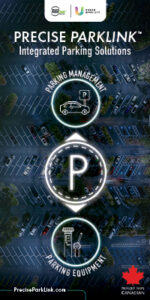Parking woes? There’s an app for that!
By Danielle Desjardins
Thanks to the advancement of mobile computing, embattled city drivers cruising for a parking spot in our cities asphalt jungles are being presented with numerous new tools.
These tools come from a new wave of start-ups catering to parking services. These apps can book parking spaces before the driver leaves, pay for it online and even, in some instances, locate available parking spaces.
Take Parkifi, for instance. The Denver company has put together a mix of way-finding, data analytics and Internet of Things (IoT) technologies that uses hardware embedded in parking spots to alert drivers to open parking spaces (the feature is only available in Denver for now).1 Last spring the app added a way for users to pay for parking from their phone2.
Parkifi (https://www.parkifi.com/) presents itself to parking operators as an optimizer of their portfolios through a better exploitation of inventory utilization, prediction of future occupancy, optimization of pricing to match supply and demand, among other things.
What they offer parking operators is “efficient visibility and marketing tool by providing a better “parking experience for drivers, increasing satisfaction and repeat business”.
Or, as Parkman, another parking tools developer based in Finland, puts it: “customers are using phones to navigate to destinations. Make sure they navigate to your garage.”3
Finding available parking spaces in real-time is no magic act. For Parkopedia, a nine-year-old London company, it involves big data. The company relies on a trove of parking data it amassed since being established in 2007: starting with humans doing the job of surveying and taking pictures of parking garages, evolving to dynamic data sets provided via APIs from partners to GPS and traffic flow information from car manufacturers, accumulating along the way petabytes of parking information in the cloud. With this information, the predictive algorithms the Parkopedia team of four PhDs developed can provide drivers with an indication of availability at a parking garage ahead of arrival.”4
Google has also entered the fray, with two new features in Google Map. The first one, Parking Difficulty shows the difficulty of finding a parking in the destination entered, based on historical parking data mixed with a little dash of machine learning. The feature is available in 25 cities around the world, among them Montreal, Toronto and Vancouver. Available only in US cities for the time being, the second feature, Find parking provides a list of parking garages and lots near their destination on the directions card, and automatically adds it to their trip5.
Cars are just another thing in the Internet of Things (IoT)
Meanwhile, most carmakers have entered what is being called the third wave of the computing revolution, the Internet of Things (IoT), of which we are in the initial stages. In the IoT revolution, computers become part of the physical world in which we live and are being woven into everyday objects. In the car industry, this means morphing cars into digital hubs, while automakers are expanding into suppliers of sustainable mobility services.
There is a good reason for that: global revenue from digital content in cars is expected to grow more than 300 percent from 2016 to 2021 and reach $ 138 billion, according to a report by the IT giant Hewlett Packard6. Revenues will come from services like mobility management, entertainment, home integration, well-being, safety, autonomous driving, and vehicle management.
“Automakers must become master integrators of digital systems throughout vehicle designs, assembly lines and supply chains — or watch new entrants drive away with market share”, the report warns.
When it comes to parking, automakers are increasingly betting on start-ups working in areas of parking infrastructure, parking solutions and parking management.
Built-in vehicle technology has an obvious advantage over phone apps: fidgeting with a smartphone while driving is not safe, even illegal in many cities, so the technology needed is basically becoming standard in new vehicles.
Porsche has opened a technology lab for developers in Berlin and acquired stakes in venture-capital fund e.ventures and parking-service provider Evopark7. The BMW Group founded BMW i Ventures – a venture capital firm based in New York City that invests in companies from the mobility sector, like ParkNow8 an app- and web-based service currently available in the greater San Francisco area and soon to be expanded to other cities.9 BMW has also entered into partnership with IBM on the automakers CarData platform. IBM will handle raw information from BMW customers that opt-in, anonymize it and then pass into IBM’s BlueMix cloud platform. Once analyzed, the data will be made available to suitable third-party providers10. The Ford Motor Co.’s has developed FordPass, a do-it-all platform that can, among other things, find and pay for parking through a collaboration with ParkWhiz, an app that finds parking in a number of American cities.
Disrupting the parking industry: there’s an app for that!
Apps makers who promise to find available parking spots with great accuracy must rely on partnerships with a broad range of parking operators willing to have the technology needed on their premises (for now, RFID sensor systems are the technology solution most commonly used). As we noted in introduction, these partnerships are advantageous for both parties.
But a new breed of parking finder apps is emerging and looking like it could disrupt these business deals: apps that let property owners list their unused parking spots and charge for their use.
One such app, Rover, developed in Toronto, is described, in the global digital media network Digital Journal11, as part of what makes the city stand out as an innovation ecosystem.
Rover was chosen by the luxury carmaker INFINITI’s for its pre-accelerator program (Toronto being the first North American destination program), is being touted as the Airbnb of parking.
Rover is not alone in this personal parking subletting business and each and every app presents itself as the new Airbnb.
If they get as popular as Airbnb or Uber, maybe they’ll eventually disrupt the parking industry. But before that happens, they will have to make sure municipal policies agree with their business model, for in many cities, owners cannot legally rent their parking space because a specific zoning is required.
But if Uber and Airbnb examples has taught us something, it’s that rules and policies are made to be broken and circumvented…
- The Denver Post, November 9 2016, ParkiFi mashes IoT and data analytics to offer better sense of where to park downtown. Online: https://goo.gl/T9zHYp
- Confluence, May 17 2017, ParkiFi partners with Parkmobile, hoping to lure new customers with combined services. Online: https://goo.gl/7tzHVM
- Parkman, December 12 2016, Attracting Drivers to Your Parking Garage in the Online Age. Online: http://blog.parkman.io/marketing-parking-garage-online
- Techworld, January 16, 2017, Parkopedia: The London startup betting big on machine learning and autonomous parking technology. Online: https://goo.gl/qsWmVu
- Google Keywords, August 29, 2017, Put it in park with new features in Google Maps. Online: https://goo.gl/LSL6Mm
- Hewlett-Parkard. New digital services, powertrains and ownership models are transforming the auto industry. Online: https://goo.gl/XFuPhw
- Bloomberg. March 2017. Your Porsche 911 Will Soon Find Its Own Parking Spot. Online: https://goo.gl/2bSzev
- https://www.park-now.com/about.html
- https://www.bmw.com.mo/en/topics/fascination-bmw/bmw-i/mobility-services.html
- Forbes, June 14, 2017, The Race To Monetize Vehicle Data Gets More Crowded As BMW Hooks Up With IBM. Online: https://goo.gl/iMiYra
- Digital Journal, August 17, 2017, Startup Rover looks to big projects to grow its parking app. Online: https://goo.gl/ckdVM2






